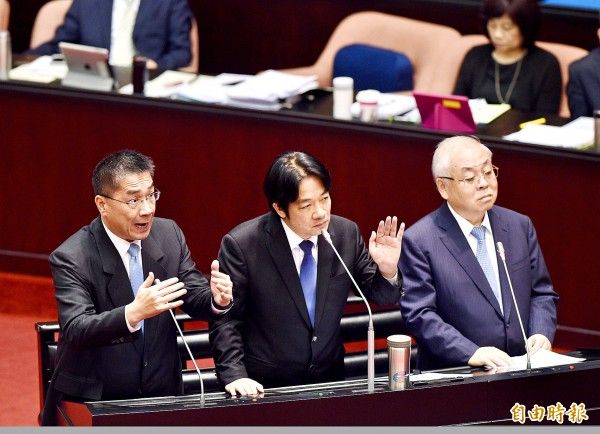《TAIPEI TIMES》 Premier details budget for fiscal 2019

Minister of the Interior Hsu Kuo-yung, left, and Premier William Lai, center, are accompanied by Directorate-General of Budget, Accounting and Statistics Minister Chu Tzer-ming as they explain the central government’s budget for fiscal year 2019 and the second phase of special budgeting for the Forward-looking Infrastructure Development Program at the Legislative Yuan in Taipei yesterday. Photo: Peter Lo, Taipei Times
FOCUS ON DEVELOPMENT: The premier said it is the first time that annual expenditure has exceeded the NT$2 trillion mark, with 2.8 percent more allocated than last year
By Chen Yu-fu and Jake Chung / Staff reporter, with staff writer
Premier William Lai (賴清德) yesterday gave a report to the Legislative Yuan on the central government’s budget for fiscal year 2019, saying that the total expenditures estimate stands at NT$2.2 trillion (US$71 billion) — an increase of NT$55.1 billion, or 2.8 percent, compared with fiscal year 2018.
It is the first time that the nation’s annual expenditure has exceed NT$2 trillion, he said.
Annual expenditures are focused on expanding infrastructure and investments; Internet development and innovations; national defense and the New Southbound Policy; reinforcing Internet security; fostering better education environments; balancing city and county development; and the sustainable development of annual funds, Lai said.
The government has allocated NT$392.7 billion for public construction investment, a 7.7 percent increase from 2018, Lai said.
The government has budgeted NT$39.8 billion to help industries pursue innovation and increase the competitive edge of Taiwanese businesses, as well as NT$22.1 billion for the Forward-looking Infrastructure Development Program, specifically for the program’s involvement in such endeavors.
An itemized list for all infrastructure expenditures includes NT$6.7 billion for the “Asia Silicon Valley” Project; NT$4.2 billion for the Industry 4.0 project; NT$7.4 billion for green energy technology; NT$10.1 billion for biological medicine industry development; NT$6.1 billion for development of innovative agriculture; NT$2.1 billion for the circular economy project; NT$16.2 billion for the promotion of the digital economy; NT$400 million for innovative cultural technology; NT$2.1 billion for chip design and semiconductor technology; NT$2.2 billion for building infrastructure for the national defense industry; and NT$3.8 billion for other innovative industries, Lai said.
The Ministry of National Defense budgeted NT$346 billion for national defense in fiscal year 2019, an increase of NT$18.3 billion, or 5.6 percent, compared with fiscal year 2018, Lai said, adding that the funding is allocated primarily for domestically produced military hardware, military maintenance, and research and development.
The government’s New Southbound Policy has budgeted NT$7 billion, with the primary fund comprising NT$3.1 billion and NT$3.9 billion allocated to for-profit and nonprofit special funds respectively, Lai said.
NT$36.9 billion is being budgeted for declining birth rate issues, an increase of NT$1.6 billion, or 81 percent, compared with fiscal year 2018, he said.
The government has budgeted NT$147.8 billion for the retirement funds of military personnel, civil servants and teachers, a decrease of NT$5.9 billion compared with fiscal year 2018, Lai said.
Central government funding to subsidize local governments has been budgeted at NT$16.6 billion — an increase of 3.1 percent compared with fiscal year 2018, he said.
Regarding the second phase of special budgeting for the Forward-looking Infrastructure Development Program, the allotted budget stands at NT$227.5 billion, with NT$12 billion going toward green energy; NT$27 billion going to digital infrastructure; NT$59 billion going to hydroengineering; NT$22 billion dedicated to railway tracks; NT$73 billion to infrastructure for cities and townships; NT$600 million to food safety; and NT$10 billion to fostering talent and employment services, Lai said.
新聞來源:TAIPEI TIMES
















